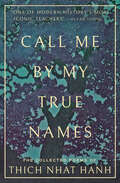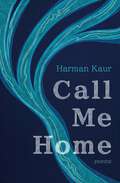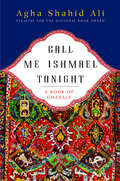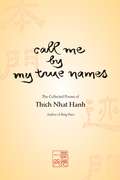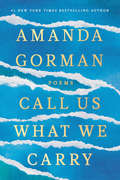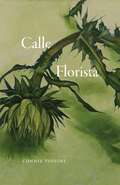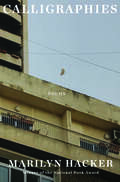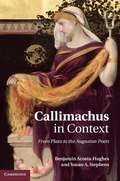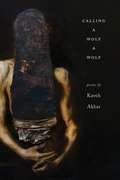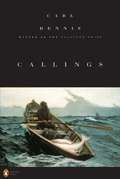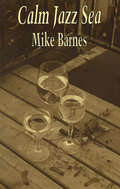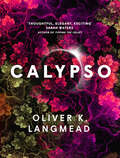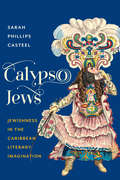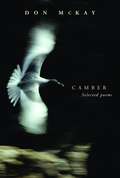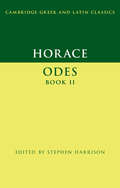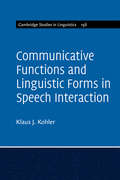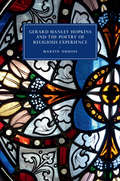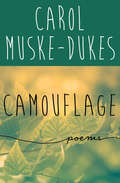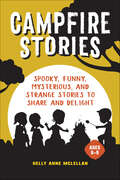- Table View
- List View
Call Me By My True Names: The Collected Poems of Thich Nhat Hanh
by Thich Nhat Hanh"Thich Nhat Hanh's work has proven to be the antidote to our modern pain and sorrows." —Ocean Vuong The definitive poetry collection by the world renowned Zen master, peace activist, and author of The Miracle of MindfulnessThough he is best known for his groundbreaking and accessible works on applying mindfulness to everyday life, Thich Nhat Hanh is also a distinguished poet and Nobel Peace Prize nominee. This stunning poetry collection explores these lesser-known facets of Nhat Hanh&’s life, revealing not only his path to becoming a Zen meditation teacher but his skill as a poet, his achievements as a peace activist, and his experiences as a young refugee.Through more than fifty poems spanning several decades, Nhat Hanh reveals the stories of his past—from his childhood in war-torn Vietnam to the beginnings of his own spiritual journey—and shares his ideas on how we can come together to create a more peaceful, compassionate world. Uplifting, insightful, and profound, Call Me By My True Names is at once an exquisite work of poetry and a portrait of one of the world&’s greatest Zen masters and peacemakers.
Call Me Home: Poems
by Harman KaurA powerful and honest force on TikTok, Harman Kaur's words are now in print. This is an exploration of the diverse manifestations of &“home&”, extending beyond its mere physicality to womanhood, spirituality, and immigration.Explore the multifaceted concept of "home" through Kaur's evocative poetry. Journey beyond its physical confines to discover its emotional and psychological depths, touching on themes like immigration, womanhood, and spirituality. Encounter narratives of loss, rediscovery, and healing that resonate with the human experience. With rich language and imagery, this collection offers fresh perspectives, inviting readers to reconsider their understanding of what it means to feel at home.
Call Me Ishmael Tonight: A Book of Ghazals
by Agha Shahid Ali"Ali's ghazals are contemporary and colloquial, deceptively simple, yet still grounded in tradition....Highly recommended."--Library Journal The beloved Kashmiri-American poet Agha Shahid Ali presents his own American ghazals. Calling on a line or phrase from fellow poets, Ali salutes those known and loved--W. S. Merwin, Mark Strand, James Tate, and more--while in other searingly honest verse he courageously faces his own mortality.
Call Me by My True Names: The Collected Poems
by Thich Nhat Hanh"The clear, still mind of this meditation teacher gives rise to piercing images time and time again. Nhat Hanh seems an inherently skilled poet.It is these poetic works,more than his essays or lectures, that show Thich Nhat Hanh clearly to be a Zen mystic". San Francisco Chronicle, "Thich Nhat Hanh's poems have an almost uncanny power to disarm delusion, awaken compassion, and carry the mind into the immediate presence of meditation. Thich Nhat Hanh writes with the voice of the Buddha". - Sogyal Rinpoche.
Call Us What We Carry: Poems
by Amanda GormanThe instant #1 New York Times, Wall Street Journal, and USA Today bestsellerThe breakout poetry collection by #1 New York Times bestselling author and presidential inaugural poet Amanda GormanFormerly titled The Hill We Climb and Other Poems, the luminous poetry collection by #1 New York Times bestselling author and presidential inaugural poet Amanda Gorman captures a shipwrecked moment in time and transforms it into a lyric of hope and healing. In Call Us What We Carry, Gorman explores history, language, identity, and erasure through an imaginative and intimate collage. Harnessing the collective grief of a global pandemic, this beautifully designed volume features poems in many inventive styles and structures and shines a light on a moment of reckoning. Call Us What We Carry reveals that Gorman has become our messenger from the past, our voice for the future.
Calle Florista
by Connie VoisineThis World and That One Sometimes you defy it, I am not that, watching a stranger cry like a dog when she thinks she's alone at the kitchen window, hands forgotten under the running tap. The curtains blow out, flap the other side of the sill. In you one hole fills another, stacked like cups. You remember your hands. Connie Voisine's third book of poems centers on the border between the United States and Mexico, celebrating the stunning, severe desert landscape found there. This setting marks the occasion as well for Voisine to explore themes of splitting and friction in both human and political contexts. Whose space is this border, she asks, and what voice can possibly tell the story of this place? In a wry, elegiac mode, the poems of Calle Florista take us both to the edge of our country and the edge of our faith in art and the world. This is mature work, offering us poems that oscillate between the articulation of complex, private sensibilities and the directness of a poet cracking the private self open--and making it vulnerable to the wider world.
Calligraphies: Poems
by Marilyn HackerA formally brilliant and powerful volume from “one of the most extraordinary innovative poets writing today” (Carol Muske-Dukes, Los Angeles Times). Moving from Paris to Beirut and back, Calligraphies is a tribute to exiles and refugees, the known and unknown, dead and living, from the American poet Marie Ponsot to the Syrian pasionaria Fadwa Suleiman. Award-winning poet Marilyn Hacker finds resistance, wit, potential, and gleaming connection in everyday moments—a lunch of “standing near the fridge with / labneh, two verbs, and a spoon”—as a counterweight to the precarity of existence. With signature passion and agility, Hacker draws from French, Arabic, and English to probe the role of language in identity and revolution. Amid conversations in smoky cafes, personal mourning, and political turmoil, she traces the lines between exiles and expats, immigrants and refugees. A series of “Montpeyroux Sonnets” bookends the volume, cataloguing months in 2021 and 2022 in which the poet observes a village “in pandemic mode” and reflects on her own aging. In a variety of tones and formal registers, from vivid crowns of sonnets to insistent ghazals to elegiac pantoums and riffs on the renga, Calligraphies explores a world opened up by language.
Callimachus in Context: From Plato to the Augustan Poets
by Susan A. Stephens Benjamin Acosta-HughesScholarly reception has bequeathed two Callimachuses: the Roman version is a poet of elegant non-heroic poetry (usually erotic elegy), represented by a handful of intertexts with a recurring set of images - slender Muse, instructing divinity, small voice, pure waters; the Greek version emphasizes a learned scholar who includes literary criticism within his poetry, an encomiast of the Ptolemies, a poet of the book whose narratives are often understood as metapoetic. This study aims to situate these Callimachuses within a series of interlocking historical and intellectual contexts in order better to understand how they arose. In this narrative of his poetics and poetic reception four main sources of creative opportunism are identified: Callimachus' reactions to philosophers and literary critics as arbiters of poetic authority, the potential of the text as a venue for performance, awareness of Alexandria as a new place, and finally, his attraction for Roman poets.
Calling A Wolf A Wolf
by Kaveh AkbarThis award-winning debut boldly confronts addiction and courses the strenuous path of recovery, beginning in the wilds of the mind. Poems confront craving, control, the constant battle of alcoholism and sobriety, and the questioning of the self and its instincts within the context of this never-ending fight. <P><P>From "Stop Me If You've Heard This One Before": Sometimes you just have to leavewhatever's real to you, you have to clompthrough fields and kick the caps offall the toadstools. Sometimesyou have to march all the way to Galileeor the literal foot of God himself before you realizeyou've already passed the place whereyou were supposed to die. I can no longer rememberthe being afraid, only that it came to an end.
Callings
by Carl DennisFrom the winner of the Pulitzer Prize and the Ruth Lilly Prize This new collection by acclaimed poet Carl Dennis is about vocation in the largest sense, the work that we believe gives our lives meaning, and the challenges that come in defining such work and in doing it well. The poems approach their subject from a variety of perspectives: a calling may involve a compromise with limitations, or be an expression of individual purpose; if a calling in some poems provides an alternative to the disorder of the world, in others it offers a means to shape the world as we are shaped by it. As the poems speak to each other, they form a dialogue of attitudes that makes room for both frustration and achievement, a dialogue that includes us and takes us beyond ourselves.
Calm Jazz Sea
by Mike BarnesShortlisted for the 1997 Gerald Lampert Award The poems in Calm Jazz Sea reveal a world forever becoming and disappearing, watched over and handled gently by the compassionate intelligence of Mike Barnes. In the everyday and the ephemeral meals, drinks, weather, work, moments of solitude or connection he finds ways to engage the secret matter of humanity: what horrifies, astonishes, or comforts us. Like the sea of the title, restless and receptive, the language of the poems moves through many levels of voice: from an easy vernacular to the strain of conversation, or from the precise record of sensual matter to the insubstantial gestures that constitute thought.
Calypso
by Oliver K. Langmead"Ambitious and immersive...an elegantly told meditation on how we can&’t leave ourselves behind." -Esquire Magazine - The Best Sci-Fi Books of 2024A ground-breaking, mind-bending and wildly imaginative epic verse revolution in SF. A saga of colony ships, shattering moons and cataclysmic war in a new Eden. Truly unforgettable and richly lyrical eco-fiction, for fans of Kim Stanley Robinson, Adrian Tchaikovsky, and Jeff VanderMeer.Rochelle wakes from cryostasis to take up her role as engineer on the colony ark, Calypso. But she finds the ship has transformed into a forest, populated by the original crew&’s descendants, who revere her like a saint. She travels the ship with the Calypso&’s creator, the enigmatic Sigmund, and Catherine, a bioengineered marvel who can commune with the plants, uncovering a new history of humanity forged while she slept. She discovers a legacy of war between botanists and engineers. A war fought for the right to build a new Earth – a technological paradise, or a new Eden in bloom, untouched by mankind&’s past.And Rochelle, the last to wake, holds the balance of power in her hands.
Calypso Jews: Jewishness in the Caribbean Literary Imagination (Literature Now)
by Sarah Phillips CasteelIn original and insightful ways, Caribbean writers have turned to Jewish experiences of exodus and reinvention, from the Sephardim expelled from Iberia in the 1490s to the "Calypso Jews" who fled Europe for Trinidad in the 1930s. Examining these historical migrations through the lens of postwar Caribbean fiction and poetry, Sarah Phillips Casteel presents the first major study of representations of Jewishness in Caribbean literature. Bridging the gap between postcolonial and Jewish studies, Calypso Jews enriches cross-cultural investigations of Caribbean creolization.Caribbean writers invoke both the 1492 expulsion and the Holocaust as part of their literary archaeology of slavery and its legacies. Despite the unequal and sometimes fraught relations between Blacks and Jews in the Caribbean before and after emancipation, Black-Jewish literary encounters reflect sympathy and identification more than antagonism and competition. Providing an alternative to U.S.-based critical narratives of Black-Jewish relations, Casteel reads Derek Walcott, Maryse Condé, Michelle Cliff, Jamaica Kincaid, Caryl Phillips, David Dabydeen, and Paul Gilroy, among others, to reveal a distinctive interdiasporic literature.
Camber
by Don MckayThe poetry of Don McKay is renowned for its piquant wit, lyric emotion, and pitch-perfect vernacular music. His work has received national acclaim and the recognition of many awards, including the Governor General’s Award for Poetry, which he has won twice, and, most recently, from the prestigious and internationally known Griffin Poetry Prize, for which his most recent book was a finalist. Camber is the lilt in the physics of flight, the anti-gravitational alchemy of both wings and poetry. It is also at the heart of the poetry of Don McKay. Spanning three decades, and drawing on all of McKay’s major collections, this selection distills the essence of his craft and provides an overview of, and an ideal introduction to, the work to date of one of Canada’s most celebrated poets.
Cambridge Companions to Literature: The Cambridge Companion to William Carlos Williams
by Christopher MacgowanThis Companion contains thirteen new essays from leading international experts on William Carlos Williams, covering his major poetry and prose works - including Paterson, In the American Grain, and the Stecher trilogy. It addresses central issues of recent Williams scholarship and discusses a wide variety of topics: Williams and the visual arts, Williams and medicine, Williams's version of local modernism, Williams and gender, Williams and multiculturalism, and more. Authors examine Williams's relationships with figures such as Ezra Pound, Wallace Stevens, and H. D. and Marianne Moore, and illustrate the importance of his legacy for Allen Ginsberg, Amiri Baraka, Robert Creeley, Robert Lowell, and numerous contemporary poets. Featuring a chronology and an up-to-date bibliography of the writer, The Cambridge Companion to William Carlos Williams is an invaluable guide for students of this influential literary figure.
Cambridge Greek and Latin Classics: Horace (Cambridge Greek and Latin Classics)
by Stephen HarrisonHorace's Odes remain among the most widely read works of classical literature. This volume constitutes the first substantial commentary for a generation on this book, and presents Horace's poems for a new cohort of modern students and scholars. The introduction focusses on the particular features of this poetic book and its place in Horace's poetic career and in the literary environment of its particular time in the 20s BCE. The text and commentary both look back to the long and distinguished tradition of Horatian scholarship and incorporate the many advances of recent research and thinking about Latin literature. The volume proposes some new solutions to established problems of text and interpretation, and in general improves modern understanding of a widely read ancient text which has a firm place in college and university courses as well as in classical research.
Cambridge Introductions to Literature: The Cambridge Introduction to British Poetry, 1945–2010
by Eric FalciThe Cambridge Introduction to British Poetry, 1945–2010 provides a broad overview of an important body of poetry from England, Scotland, Wales, and Northern Ireland from the postwar period through to the twenty-first century. It offers a comprehensive view of the historical context surrounding the poetry and provides in-depth readings of many of the period's central poets. British poetry after 1945 has been given much less attention than both earlier British and American poetry, as well as postwar American poetry. There are very few single-author studies that present the entirety of the period's poetry. This book is unique for the comprehensive richness with which it presents the historical and literary-historical scene, as well as for its close-up focus on a wide range of major poets and poems.
Cambridge Studies in American Literature and Culture: The Poetry of Disturbance
by David BergmanIn The Poetry of Disturbance, David Bergman argues that post-war poetry underwent a significant if subtle shift in emphasis, moving from the modernist concern with the poem as a visual text to one that was chiefly oral in nature. The resulting change was disturbing, especially for those brought up on the principles of high modernism. This new stress on orality implied a shift in the economy of the poem, away from the austerity of language advocated by Pound and Eliot to a style that conveyed freedom, expansiveness, and an innovative directness.
Cambridge Studies in Linguistics: Communicative Functions and Linguistic Forms in Speech Interaction
by Kohler Klaus J.Prosody is generally studied at a separate linguistic level from syntax and semantics. It analyses phonetic properties of utterances such as pitch and prominence, and orders them into phonological categories such as pitch accent, boundary tone, and metrical grid. The goal is to define distinctive formal differentiators of meanings in utterances. But what these meanings are is either excluded or a secondary concern. This book takes the opposite approach, asking what are the basic categories of meaning that speakers want to transmit to listeners? And what formal means do they use to achieve it? It places linguistic form in functions of speech communication, and takes into account all the formal exponents - sounds, words, syntax, prosodies - for specific functional coding. Basic communicative functions such as 'questioning' may be universally assumed, but their coding by linguistic bundles varies between languages. A comparison of function-form systems in English, German and Mandarin Chinese shows this formal diversity for universal functions.
Cambridge Studies in Medieval Literature: The Evolution of Verse Structure in Old and Middle English Poetry
by Geoffrey RussomIn this fascinating study, Geoffrey Russom traces the evolution of the major English poetic traditions by reference to the evolution of the English language, and considers how verse forms are born, how they evolve, and why they die. Using a general theory of poetic form employing universal principles rooted in the human language faculty, Russom argues that certain kinds of poetry tend to arise spontaneously in languages with identifiable characteristics. Language changes may require modification of metrical rules and may eventually lead to extinction of a meter. Russom's theory is applied to explain the development of English meters from the earliest alliterative poems in Old and Middle English and the transition to iambic meter in the Modern English period. This thorough yet accessible study provides detailed analyses of form in key poems, including Beowulf and Sir Gawain and the Green Knight, and a glossary of technical terms.
Cambridge Studies in Nineteenth-Century Literature and Culture: Gerard Manley Hopkins and the Poetry of Religious Experience (Cambridge Studies in Nineteenth-Century Literature and Culture #108)
by Martin DuboisThis nuanced yet accessible study is the first to examine the range of religious experience imagined in Hopkins's writing. By exploring the shifting way in which Hopkins imagines religious belief in individual history, Martin Dubois contests established views of his poetry as a unified project. Combining detailed close readings with extensive historical research, Dubois argues that the spiritual awareness manifest in Hopkins's poetry is varied and fluctuating, and that this is less a failure of his intellectual system than a sign of the experiential character of much of his poetry's thought. Individual chapters focus on biblical language and prayer, as well as on the spiritual ideal seen in the figures of the soldier and the martyr, and on Hopkins's ideas of death, judgement, heaven and hell. Offering fresh interpretations of the major poems, this volume reveals a more diverse and exploratory poet than has been recognised.
Cambridge Studies in Nineteenth-Century Literature and Culture: Translation as Transformation in Victorian Poetry
by Annmarie DruryTranslation as Transformation in Victorian Poetry illuminates the dynamic mutual influences of poetic and translation cultures in Victorian Britain, drawing on new materials, archival and periodical, to reveal the range of thinking about translation in the era. The results are a new account of Victorian translation and fresh readings both of canonical poems (including those by Browning and Tennyson) and of non-canonical poems (including those by Michael Field). Revealing Victorian poets to be crucial agents of intercultural negotiation in an era of empire, Annmarie Drury shows why and how meter matters so much to them, and locates the origins of translation studies within Victorian conundrums. She explores what it means to 'sound Victorian' in twentieth-century poetic translation, using Swahili as a case study, and demonstrates how and why it makes sense to consider Victorian translation as world literature in action.
Camouflage: Poems
by Carol Muske-Dukes&“Lies, wishes, fantasies—all the weaponry of compassionate imagination at war with society—deploy with delicious satire in [Muske-Dukes&’s] first book.&” —Library JournalA poet, novelist, critic, and essayist, Carol Muske-Dukes has established herself as one of the preeminent talents of modern American writing. Birth, loss, imprisonment, and renewal are among the subjects of Camouflage, her first published book of poems. These twenty-eight poems are a young writer&’s stream of consciousness set in formal verse. In &“Photographer,&” Muske-Dukes slides between light and dark. &“Salad Days: Nebraska, 1964,&” relives a plane ride over the state&’s rolling plains. And the tongue-in-cheek yet respectful &“Swansong&” evokes a childhood ballet class, taught by a faded prima ballerina. Each poem is a skin, a mask, a camouflage meant for survival—a place of regeneration and change.
Campesinas
by José María Gabriel y GalánJosé María Gabriel y Galán es el poeta del pueblo sencillo y campesino. Retrata en su poesía las formas de vida de esas gentes paupérrimas del medio rural de esa región extremeña que fue conocida a principios del siglo XX por su extremada pobreza. Es muy difícil hacer bellas poesías de esas situaciones de extrema pobreza y de hambre endémica, y sin embargo el ojo de atento observador de este gran poeta, supo dictar a su mano los más profundos versos que pueda inspirar la más humilde gente. En su tiempo, la poesía de Gabriel y Galán fue muy denostada por esos eruditos de las letras cultas que sólo encuentran calidad poética cuando se canta a lo acomodado, a lo opulento, a lo fatuo y a lo superfluo; y a todo ello se le dota de un lenguaje críptico, y sofisticado. Es una poesía que verso a verso, retrata a las gentes campesinas de Castilla y de Extremadura, y que desprende efluvios de la profunda y sencilla poesía construida con el lado bueno del corazón.
Campfire Stories: Spooky, Funny, Mysterious, and Strange Stories to Share and Delight
by Kelly Anne McLellanTell exciting tales around the campfire—for kids 6 to 9 Camping with your family can be a blast. You can build campfires together. You can roast marshmallows. And best of all, you can tell stories. This camping book for kids is filled with amazing tales children will love sharing. From a mysterious fog to two heads in a suitcase, these stories are sure to excite and delight!A terrific range of tales—Discover 16 stories divided into four categories: spooky, funny, mysterious, and strange. Whether kids want to scream with laughter or fear, there's something for everyone.The perfect length—These stories are purposely crafted to be quick and engaging, guaranteeing they'll capture every child's attention. Plus, they make for great reading practice!Enhance the experience—Kids can easily augment their trip with awesome storytelling tips, suggestions for games to play, and ideas on how they can help out around the campsite.Ensure your kids have a memorable campout with this excellent collection of campfire stories.
